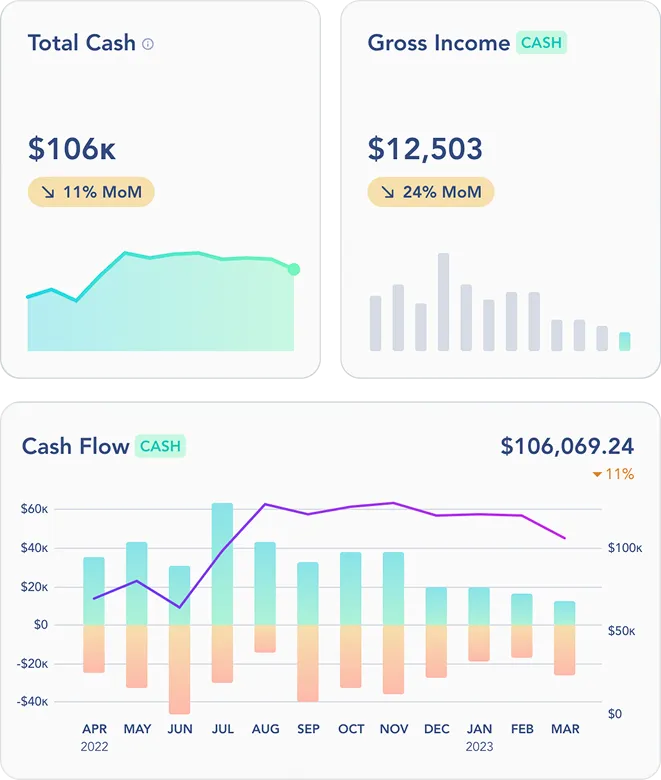
Accounting for Startups: Everything a Venture-Backed Founder Needs to Know
 Team Digits
Team Digits
Accounting is one of the least exciting parts of doing business, but as a founder, you can't afford to ignore it. Messy books and cash flow surprises can quickly throw you off course and make it difficult to secure funding.
In this guide, we will walk you through everything you need to know about accounting for startups, including how to set up your own system.
Why is good accounting important for venture-backed startups?
Although accounting isn't the glamorous side of running a startup, it's critical if you're venture-backed — or plan to be.
Why? Because if your books become a financial black hole, investors will lose confidence in your ability to build a successful company.
Detailed and accurate financial insights give VCs a clear picture of how the company is doing, from revenues and expenses to cash flow. If the numbers don't add up, it raises red flags about potential mismanagement, dishonesty, or incompetence.
Good accounting also keeps you compliant and prevents the business from going under because you messed up on taxes or forgot to file the right paperwork.
Plus, when you want to scale, raise another round, or get a loan, clear and accurate financials make due diligence a breeze.
What does startup accounting include?
Accounting for startups includes numerous processes, from bookkeeping to tracking accounts receivable and payable.
While this may seem complex at first, getting the hang of accounting now will help you avoid much worse (and more expensive) headaches later.
1. Bookkeeping
Bookkeeping is a process that records data about everyday financial activities (sales, payments, etc.)
It helps you ensure all financial data is up to date and correctly categorized, so it's easier to put together reports, manage cash flow, and prepare for tax filings.
Typically, one uses dedicated bookkeepers or software. But note that bookkeeping isn't the same as accounting.
The difference between bookkeeping and accounting is that bookkeepers record daily financial transactions while accountants take financial data and generate insights. They are responsible for creating reports such as important financial forecasts for the boardroom.
Your accountant will help you with reporting, strategic financial planning, auditing, and tax filing, in addition to other services.
2. Financial record keeping
Good startup accounting practices require you to save and organize all financial documents related to your business.
Examples of financial records include:
- Invoices: Records of payments requested from customers for goods or services provided
- Receipts: Records of company expenses
- Payroll: Records about your employee salaries, wages, and bonuses
- Bank statements: Monthly records of all transactions through the startup's bank accounts
- Tax returns and filings: Documentation of all tax filings, including income taxes, sales taxes, and payroll taxes
3. Cash flow management
Cash flow management is essential in accounting for startups because it ensures your company has enough funds to cover day-to-day operational costs.
With this method, you track accounts receivable and payable, so there's always enough cash available.
For example, you might avoid immediately paying a vendor until a specific payment comes in because there's a temporary cash shortage.
4. Budgeting
A budget sets up guardrails for your spending, preventing you from running out of runway before the next round of funding.
Once you've developed a budget, it'll be easier to make smarter decisions on processes such as hiring.
Most companies spend a large amount on payroll, and a clearly defined budget will guide your hiring approach. If a full-time employee is too expensive, freelancers and independent contractors are a good alternative.
5. Tax planning and compliance
Startups that pay attention to tax planning and compliance from the outset are more likely to avoid costly penalties and maximize savings. Note that even if you're not turning a profit, you must still file your annual tax return (state and federal).
Proper tax planning ensures you're taking advantage of deductions, credits, and incentives to save you money.
For example, the R&D tax credit in the US can significantly lower your tax bill if you're developing new products or technology.
Compliance, on the other hand, is about making sure you follow all applicable laws.
Consider a company that misclassifies an employee as a contractor. They could face hefty fines and lawsuits, as with startup Homejoy. In 2015, it faced four worker misclassification lawsuits and ultimately shut down as the lawsuits scared off investors.
Compliance is essential for venture-backed startups. Investors expect your financials to be squeaky clean. A tax issue hurts your cash flow and damages investor trust.
Lastly, tax planning ensures you're prepared for growth. If you expand to new states or countries, you must be ready to manage new tax requirements. And this is much easier to do when you already have your ducks in a row.
6. Financial analysis and reporting
The corporate world uses financial analysis and reporting to assess a company's performance and guide decisions.
You can think of it as taking the pulse of your business. Financial analysis digs into your revenue, expenses, cash flow, runway, and profitability, helping you understand what's working and what's not.
Without it, it's tough to identify inefficiencies, spot growth opportunities, and decide where to allocate resources.
For a venture-based startup, financial reporting is more than a tool for internal teams. Investors also use it to measure your progress and see if you're hitting certain milestones.
7. Payroll management
Payroll management is the process of paying your employees compliantly and on time. It encompasses everything from calculating their hours to tax withholding and saving payroll documentation.
Issues with payroll management could lead to:
- Violations of state and federal employment laws
- Valuable employees quitting or deliberately lowering their performance
- Cash flow issues
8. Accounts payable and receivable
Accounts receivable refers to payments customers owe you for delivered products or services. For example, if your startup sends an invoice for a monthly subscription fee, it falls under accounts receivable until the customer makes the payment.
Accounts payable is the opposite of that. It represents money your startup owes to vendors, suppliers, and other service providers.
Tracking accounts receivable keeps your finances healthy. For instance, if a startup has $50,000 in unpaid invoices, this limits its ability to cover expenses or invest in growth.
Monitoring accounts payable helps you pay bills on time, avoiding late fees or strained relationships with suppliers.
What accounting options are there for startups?
Accounting does include a lot of processes. But the good news is that you don't have to do them armed with just a calculator and a spreadsheet. Here are the different options at your disposal:
1. Software
Accounting software helps you automate and manage your startup's financial transactions and reporting.
It simplifies tasks like:
- Invoicing
- Bookkeeping
- Payroll
- Tax deductions
According to Andrew Royer, CPA, CGA, good accounting software might even help you delay hiring staff and reduce costs because you can handle many accounting tasks independently.
Plus, the added efficiency creates time during the day to focus on more important things, such as cash flow management.
2. In-house or outsourced accountants
DIY-ing your accounting works as long as your startup is small.
But as your revenue and headcount get bigger and more complex, you'll need to find a more permanent solution.
Outsourcing to an accounting firm is generally cheaper than hiring a full-time employee to work in-house.
But you still get all the benefits of working with an accountant, including their expertise in tax planning and financial forecasting.
That said, hiring an in-house accountant means they'll get to know your business inside and out, making it easier to get personalized financial advice.
3. Digits
If you're unsure whether to hire staff or get traditional accounting software, a third option gets you both: Digits.
Digits is an automated accounting platform that streamlines bookkeeping and tax prep. It provides real-time financial insights by connecting to your bank accounts and credit card data. (We integrate with over 12,000 financial institutions.)
With an average time to close of five days after the end of the month, Digits generates ready-to-share reports (cash flow, profit & loss, etc.) that you can forward to your investors and update them on your progress.
AI-powered bookkeeping automatically classifies transactions, and our team of US-based expert accountants reviews each transaction to confirm that it was classified correctly.
Regarding expenses, Digits' AI bill pay is an easy drag-and-drop solution that automatically extracts bill details (including line items) from invoices. Then, all that's left to do is decide how you'll pay.
How to pick the right startup accounting service
If you're pre-seed to Series A, and your financials are relatively simple, an accounting platform is all you need.
However, software is only as good as its users. If you're not comfortable with numbers, you could end up with messy books and poor reporting.
The good news is that Digits automatically generates reports, so you don't need a degree in finance to understand the data.
It'll be super easy to answer difficult financial questions with interactive dashboards containing your key metrics, such as runway or net income,
How to start an accounting system for your startup
Before you build an accounting system for your startup, first separate your finances by opening a business bank account. Then, follow the steps below:
1. Choose an accounting method
There are two accounting methods: cash basis and accrual basis.
Under cash basis accounting, your business:
- Records income and expenses when "cash changes hands," i.e., when a payment leaves or hits your bank account.
- Gets a clear picture of your current financial standing.
This method is suitable for very small startups with pay-as-you-go models. However, it doesn't show accounts receivable or payable, which might paint an inaccurate picture of your financial health.
Under accrual basis accounting, your business:
- Records income and expenses when you earn or incur them, whenever you make the payments.
- Gets a more accurate picture of its long-term financial health, since the accrual method factors in accounts receivable and payable.
Accrual accounting is a requirement if you plan to scale, take on investors, or apply for loans. However, it's more complex and may provide a misleading picture of your cash flow.
2. Select accounting software
As a new startup, spreadsheets might've been enough to cover your basic accounting needs.
Now, you need actual accounting software to generate financial reports, track accounts receivable and payable, automate billing, and more.
As a startup founder, your goal should be to pick software that automates accounting processes like bookkeeping and gives instant insights into your financial performance.
3. Set up your chart of accounts
A chart of accounts (COA) lists all the financial accounts in your startup's general ledger.
For example, your COA may include assets, liabilities, and shareholders' equity. Under assets, you can include cash, accounts receivable, savings, etc.
Typically, companies list balance sheet accounts first, then income statement accounts. To simplify tracking and reporting, assign each account a unique number.
Here's what an example COA looks like:
4. Establish a bookkeeping routine
When you're knee-deep in product development and fundraising, it's easy to forget about bookkeeping. That's why you should put it in your calendar — set aside time every week to review and update your records.
Your bookkeeping routine should include logging all expenses and income and sending reminders for late payments. You should also reconcile business bank accounts, credit cards, and loans.
Use accounting software to automate bookkeeping as much as possible, including tasks like reconciliation and classifying bank transactions.
5. Set up a payment system
By setting up a smooth payment system, you'll avoid cash flow issues and make it a breeze for customers to work with you. Payment platforms like Stripe or Square can streamline payments (even recurring ones) and reduce time spent chasing down checks.
Conversely, you'll also need a system for paying your bills — think payroll and vendor invoices. This process gets pretty tedious, so automating it with AI will save you hours per month and make sure you pay invoices on time.
Missed payments can lead to fees and damage relationships with key vendors or talent, which is the last thing you need when you're scaling fast.
6. Implement an expense management system
An expense management system tracks employee spending and reimbursements.
The easiest way to do so is by implementing an expense management platform such as Expensify or Brex.
These platforms will ensure that you've documented all expenses in case of an IRS audit. They can also integrate with many accounting systems, simplifying bookkeeping.
7. Establish internal financial controls
Financial controls encompass all policies and procedures that protect sensitive financial data and operations.
Specifically, they safeguard your startup from fraud, regulatory violations, misappropriation of funds, and errors.
Implement three types of controls in your startup:
- Detective controls: Identify problems as they come up. Bank account reconciliation is a good example.
- Corrective controls: Fix issues and restore compliance after a violation took place. For example, you could define a step-by-step process to help employees flag issues.
- Preventive controls: Prevent violations from taking place. For instance, your startup could get a virtual card with controls that limit the amounts someone can spend, and the time of day they can use it.
8. Plan for taxes
Planning for taxes ahead of tax season will help you avoid paying too little or too much to the IRS.
First, you want to select the right type of business entity, especially as your startup grows. Business entities come with different tax benefits, so don't forget to research them beforehand.
Right now, your startup might be a sole proprietorship or general partnership. In the future, you might change it to a C corporation.
Also, take advantage of any tax credits and deductions you're eligible for. This will lower your taxable income.
Once you start hiring employees, introduce tax-deductible benefits such as health care plans, paid leave, retirement plans, and tuition reimbursements.
9. Develop a financial reporting system
As part of your financial reporting system, set up reports such as:
- Balance sheet (assets, liabilities, and shareholder equity)
- Income statement (revenue and expenses)
- Cash flow statement (how cash moves in and out)
When using Digits, these financial reports automatically generate at the end of the month, so you don't have to do any manual work.
You can also create a custom report with all the key data your investors and advisors want to see, then share it with them for easy collaboration.
Get your startup the accounting software it deserves
Considering all the tech advancements in the last couple of years, there's no reason why founders should struggle with clunky, outdated accounting software.
Digits has developed an accounting platform that features AI bookkeeping and bill pay alongside drag-and-drop live dashboards and reports. This saves you an average of 10 days per month and $8000 per year on accounting-related tasks.
Excited to learn more? Book a demo today to see how Digits can help you take control of your finances.


